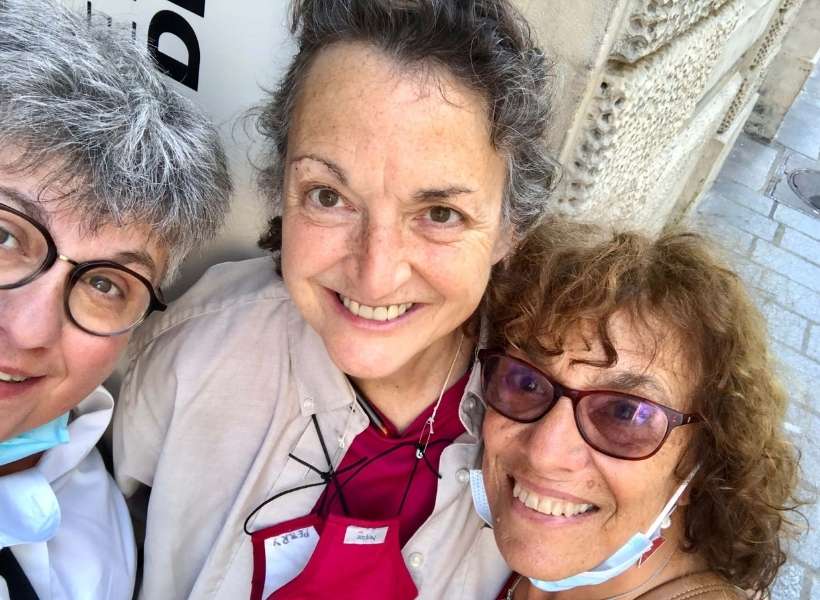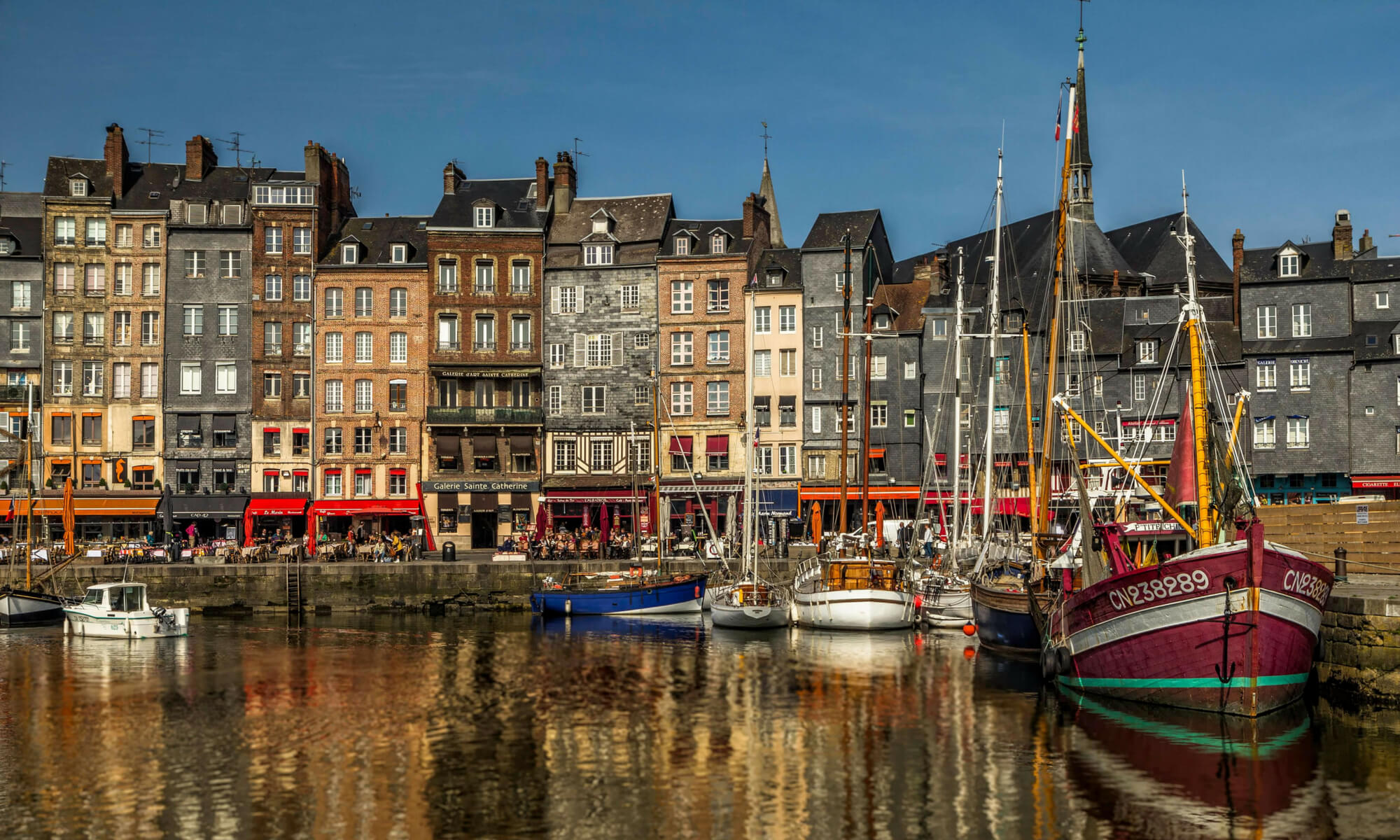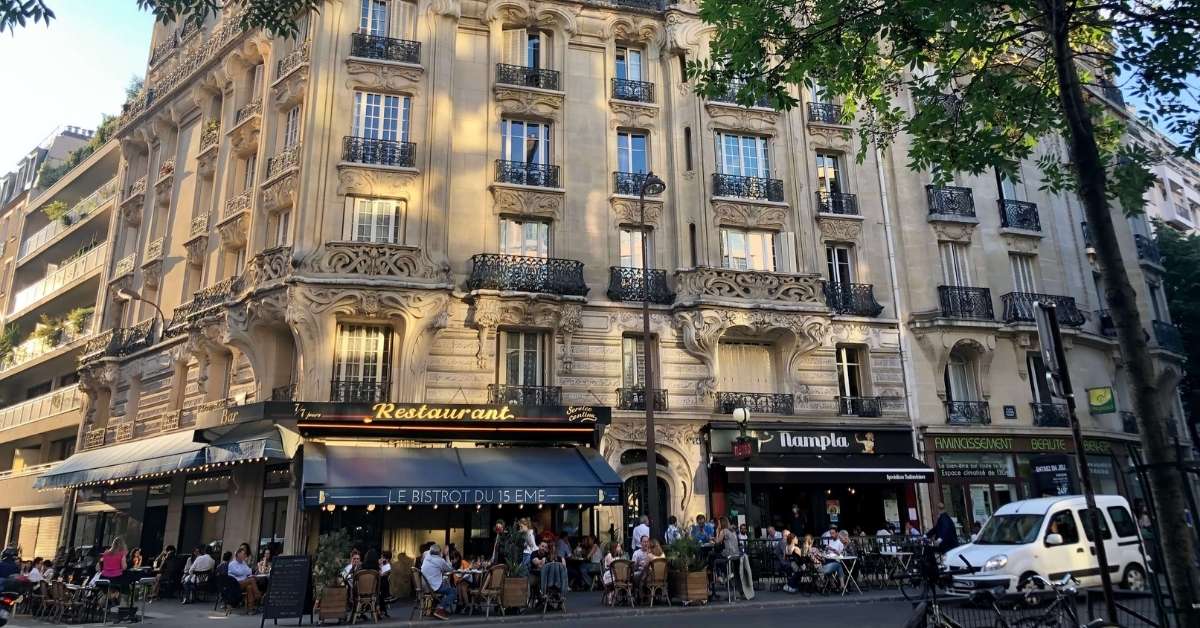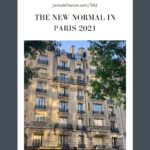Categories: French History, Paris
This is Join Us in France Episode 342. Bonjour, I’m Annie Sargent and Join Us in France is the podcast where we look around France so you can best enjoy France as a destination. We talk about French culture, history, gastronomy and everything it takes to have a wonderful time in France. Today I bring you a conversation with Elyse Rivin and Patricia Perry about the new normal in Paris and what it’s like to visit France as travel starts up again. Elyse and I just came back from Paris and we want to tell you all about it.
And did you know that for 3 years the capital of France was in Brazzaville in the Congo? I will tell you about that after my chat with Elyse and Patricia.
If you like what we do here at Join Us in France, consider supporting us by visiting joinusinfrance.com/boutique to check out my books, tours and services such as my itinerary review where I help you craft the best vacation in France specifically for YOU.
Follow Addicted to France on Instagram to see my photos of the new normal in Paris, I’ll post them this week.
he best way to stay in touch with me and with the podcast is to sign up for the newsletter at joinusinfrance.com/newsletter I only sent one photo of the day while in Paris. I should know myself better: when I walk around Paris all day by the end of the day I am spent. But, fear not, I’ve recuperated and I will share a selection of my best photos with newsletter subscribers soon!
Our Day to Day Plan
Annie and Elyse spend 3 1/2 days in Paris and it feels like we crammed a whole week into 3 1/2 days!
Day One (half-day)
Musée de l'Armée
We went to the Musée de l'Armé to see the exhibit called Napoléon n'est plus. It started with Elba and dealt with the decline of Napoleon. It was a fine exhibit, but a bit morbid in our opinion. There is so much to see at the Musée de l'Armée, the building itself is worth the visit!
Pompidou Center
While we were doing that Elyse went to see an exhibit about Women painters at the Pompidou where they will soon start on renovations that will last for 2 years.
Louvre Museum
Then we all went to the Louvre to see an exhibit called L'Ame et le Corps about Italian Renaissance. It was neat, but what shocked us mostly is how empty the Louvre was. You have to have a timed reservation to go in and they don't let over a certain number of people into the museum.
Day Two
Les Halles de la Villette
The next day we went to La Villette to see an amazing Napoleon exhibit. This one was very comprehensive and really well done. They were very good at showing all the turning points in Napoleon's life. It's so easy to get lost in the weeds with Napoleon but they did not.
Le Foyer de la Madeleine
La Madeleine is a huge church in Paris that looks like a Greek temple. We didn't have time to go inside the church because we went there for lunch. There is a little restaurant in the basement of La Madeleine church. You have to get a 5€ membership and then you buy a 12€. The whole staff is made up of volunteers and you go for a good cause because they serve lunch to people who can pay and in the evening they serve the homeless. The food was fine but nothing to write home about.
Malmaison
In the afternoon we went to Malmaison, the chateau where Napoleon and Josephine lived. It's a little further away, but it's fairly easy to get to. It's a bit of a stuffy French museum, but the chateau is worth seeing and the gardens are lovely. We would only recommend this to people who've been to Paris several times.
Day Three
The Carnavalet Museum
The Carnavalet museum has just reopened after 4 years of renovations and pandemic closures. They've done an outstanding job with the renovations and we loved it so much that we'll soon produce an episode just about the Carnavalet Museum.
The museum is free, but you must get a timed-entry ticket. We recommend you do this several days in advance because it's a popular place! This museum is a Hôtel Particulier in the heart of the Marais, the gardens are gorgeous, the restaurant looks fabulous.
L'Atelier des Chefs
L'Atelier des Chefs is a quick cooking class plus lunch. Cooking time is 1/2 hour, you can linger and eat at your leisure. The class takes place in a kitchen supply store and the class is taught in French by a young French chef. You'll learn some basic cooking techniques and will get to ask questions. Very good for a novice cook. We went to the one in the 4e arrondissement which is pretty close to the Carnavalet Museum.
The New Normal in Paris: Bicycles!
There are so many more bicycles in Paris than before the pandemic! This is definitely a big change and it looks like that change is here to stay. This website gives a lot of good information about cycling in Paris. Pedestrians please watch out for bicycles before stepping off the sidewalk!
In Paris you can rent regular bicycles and electric bikes from Vélib and Lime as well as a few other vendors.
La Bourse Pinault Collection
La Bourse is also a brand new museum and a must-see for people who enjoy modern and contemporary art. The old Paris stock exchange was redone by Japanese architect Tadao Ando.
Day Four
We spent the whole day visiting the chateau of Chantilly. It was a nice place that's a must-see for people who love art and horses. We will do a full episode about this place because there's a lot of history and art there.
The New Normal in Paris: Going Back After the Pandemic
This was Elyse's first time in Paris after 2 years away. It is a little bit overwhelming going back to a city after living like a hermit for so long.
- Paris is not nearly as packed as it used to be. We hardly saw any Americans or tourists from any other countries.
- The metro is not as crowded, but it is still full, there were lots of times where it was standing room only.
- French people are quite compliant about wearing the mask in the metro.
- Parisians are very happy to be returning to normal life and they are happy to chat and have a good time. Even grumpy museum people were super friendly.
- Concerts and venues are all reopening and the metro is full of ads announcing events.
- The first day department stores reopened the staff actually clapped for the patrons who came to shop.
- If you've been vaccinated you have nothing to fear from visiting Paris. If you haven't been vaccinated, what are you waiting for?
- You will need reservations for every museum you visit. You'll need to make an account before you can reserve. Be patient, some of those web sites are not great, but they work, eventually. Don't leave the reservations to the last minute!
This Week in French News
- The mandate to wear masks outside was lifted on June 17th unless you’re at a big demonstration or a crowded market or anywhere there are lots of people around.
- N0 more curfew after June 20th (original announced date was June 27th, so this is happening earlier than planned.)
- The US and Canada are now in the list of green countries which means if you’ve been vaccinated, you’re good to travel and if you haven’t all you need is a recent PCR test proving that you’re not infected. No more pressing reason to travel. UK passport holders are still on the orange list which means fully vaccinated + recent PCR test.
- France is reopening slowly but surely and so far, no Covid-19 spike, let’s hope this trend continues so we can put this pandemic in the rear-view Mirror. Around 50% of French people have had one dose of the vaccine and 25% have had 2 doses. Anyone over 12 can be vaccinated and getting an appointment is not difficult at this time. They’ve also reduced the time between shot 1 and 2 to 4 weeks so that people don’t hold off getting vaccinated until September just because they’re going on vacation.
- If you’re coming soon and will require a Covid-19 test before you can get on the plane home, fear not. Getting a test is easily done in France. Blood laboratories do them, so do most pharmacies. If you’re going to do your test in a laboratory you need to do it 2 days before your fly date or you may not have the results in time. Pharmacies can do a test in 15 minutes. And they are FREE!!!
L'Appel de Brazzaville
For my personal update this week I want to take a few minutes to tell you about the Call of Brazzaville. I think it’s safe to bet that all of you have heard of June 18, 1940 the day when General de Gaulle called upon French troops to rally to him in exile from the studios of the BBC in London. On that day he mentioned that France was not alone, that French colonies or the French Empire was also called to play a role. The Call of Brazzaville came soon after the call he made from the BBC in London and took place on October 26, 1940.
La France Libre
We have to remember that De Gaulle had no army and no territory. In fact, half of France was under German rule through invasion (we call that occupied France), the other half was under the control of Pétain who worked with the Germans and allowed them to do whatever they wanted, including round-up Jews and send them to death camps (Vichy’s France).
De Gaulle started a third France “La France Libre” for which he was searching for legitimacy and institutions. He created the Conseil de Défense de la France in Brazzaville and made Brazzaville the capital of Free France (which continued for 3 years until the liberation of France). The first edition of the official newspaper of “La France Libre” was published in Brazzaville.
Relying on the French Empire
In terms of land area and population, French colonies were 22 times bigger than the French mainland and had twice as many people living in those countries than the mainland France. The colonies were full of young men many of whom were willing and eager to serve. The Tchad, Cameroun and the Congo under the leadership of Felix Eboué announced they were joining De Gaulle very quickly.
Félix Eboué
Felix Eboué, a black man born of emancipated slaves in French Guyana, had a brilliant career in the French administration by going through the all the schools that train administrators and rose in the ranks quickly. By the time De Gaulle called sent his SOS to the French Empire, Eboué was the governor of Equatorial French Africa. He had an advantage in that he was black but not African. This made it easier for him to rise above the disputes that plagued the different cultures within French speaking Africa and look for common ground.
Because Félix Eboué pledged to support De Gaulle he gave him some territory, an army, and a capital Brazzaville. Why Brazzaville and not some other large city in the French colonies? Because not every colony was as enthusiastic about the prospect of supporting France against German invasion.
African Soldiers
Between 1939 and 1944 there were 140,000 black soldiers who fought along French soldiers. 24,000 of them were either made prisoner or killed during that period. The Senegalese Tirrailleurs were famous and fought in WWI and WWII all over Africa AND mainland France. Later this year I’ll tell you about the Débarquement de Provence in which Senegalese troop played a major role.
African troops didn’t get the recognition they deserved then and they still haven’t to this day. The Senegalese troops should have been able to parade down the Champs Elysées in 1944 the same way American and English troops did, but they were denied the honor. I can’t say for sure why that was, but I can assume that it had something to do with pervasive racism.
At any rate, it is clear to me that African soldiers of the French Empire came to the rescue when De Gaulle called 81 years ago and I am grateful for their service.
FOLLOW US ON:
Discussed in this Episode
- Coming back to France after the pandemic
- L'Appel de Brazzaville
- Général de Gaulle
Subscribe to the Podcast
Apple YouTube Spotify RSSSupport the Show
Tip Your Guides Extras Patreon Audio ToursIf you enjoyed this episode, you should also listen to related episode(s):
- 10 Things to Do in Paris for First Time Visitors, Episode 179
- What to Skip in Paris, Episode 41
- When People Hate Paris, Episode 210

Categories: French History, Paris



